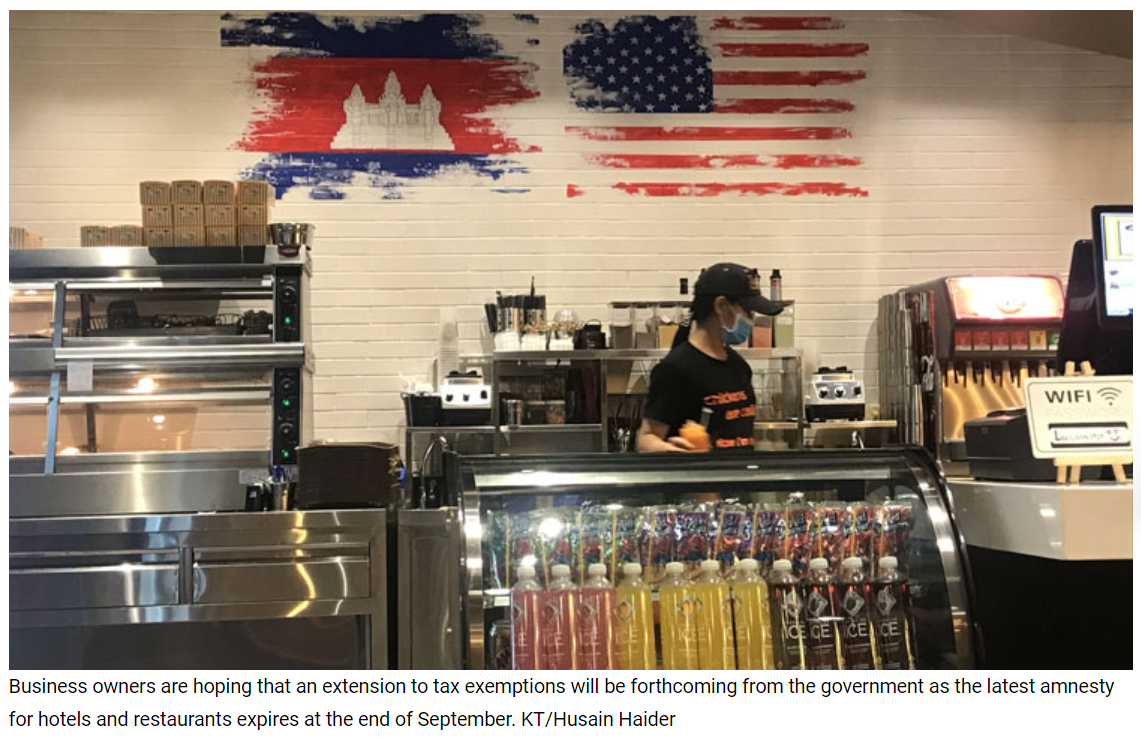Cambodia: Tourism sector hopeful tax breaks will be extended again
Government tax exemption status for restaurants and hotels is set to expire on Sept 30 with the authorities undecided as of yet about whether they will be extended again following the granting of nine previous rounds of amnesty.
The restaurant industry contributed to some 19 percent of gross domestic product growth in 2019.
Revenue fell by 50 percent in 2020 and Cambodia Restaurant Association (CRA) President Arnaud Darc said at a forum yesterday that 2021 is not looking better, with the industry already experiencing a 60 percent drop since last year.
“We estimate that the share of consumers dining at sit-down restaurants has declined 85 percent since the pandemic began,” Darc said during an online webinar on Cambodia Restaurant Tax.
Chef Luu Meng, chief executive officer (CEO) for the Almond Group, told Khmer Times that extending the tax exemption is “the most important issue” for the industry.
“We would like to see the government be able to extend it to the end of 2021 and hopefully early 2022. We will be able to pay tax to the government when business travel resumes at the end of 2021,” said Meng, who is also president of the Cambodia Tourism Federation.
He stressed that many businesses would not be able to continue operating had they not been granted tax exemptions and employment figures may have suffered as a result.
“The tax exemption from the government to help businesses in the tourism sector is the most important issue right now. Businesses need money to pay for the upkeep of buildings, rental and salaries for staff. Maintaining it will allow businesses to stay open and keep staff employed,” Meng continued.
Eng Ratana, director for the General Department of Taxation’s (GDT’s) Department of Large Taxpayers, said during the webinar that he did not have any indication whether the tax amnesty would continue.
Ratana said the government will decide on whether to continue the grace period depending on the state of the pandemic, noting that he had personally stopped eating out.
“We are not sure what will happen [with the tax exemption or]what will happen with the pandemic. We pray that it will go away and we understand that the tourism sector is most severely impacted,” he noted.
Anthony Galliano, group CEO for Cambodian Investment Management Holdings, noted that the government introduced its first round of measures after inbound flights to Siem Reap town were cancelled. Businesses in that province were granted a tax amnesty prior to their expansion to the capital and Kep, Preah Sihanouk, Kampot, Bavet and Poipet provinces.
“The government has tried through a series of rounds over the last 16 months or so to support the restaurant and hotel industry during this very difficult time,” Galliano said.
He also noted that it was difficult to predict how long tax exemptions for the tourism industry will continue but noted that they last for two to three-month periods.
Galliano added that with no firm date as to when the pandemic will ease, the periods of uncertainty when it is difficult to predict whether exemptions will end will continue.
“The hospitality sector is rapidly shrinking, despite government support and there needs to be a recovery plan that includes tax incentives to stimulate investment that fosters longevity and sustainability. The silver bullet may very well be refining the small taxpayer status which offers substantial tax benefits and advantages,” he continued.
Galliano said that it is “virtually impossible” for foreign nationals to register as small taxpayers.
“Given that small taxpayers charge VAT [value-added tax] at 10 percent but pay over 2 percent with no withholding tax except on rent and salaries, have simple tax forms, have lower profit tax tiers, lower patent tax and are not prone to audits, this is the most appropriate model to relaunch the industry,” Galliano said.
The American Chamber of Commerce president believes that the government should expand the threshold for foreign-owned small businesses and allow firms that register $500,000 or less in revenue to receive benefits afforded to small taxpayer Cambodian-owned businesses.
He stressed that allowing limited liability companies to be registered as small businesses would also “resurrect the industry, encourage investment and promote durability in the restaurant industry which has a fail rate of 60 percent in the best of times”.
The GDT undertook 83 measures to reform tax regulations last year, including eight avoidance of double taxation agreements.
Ratana said that the department is currently negotiating DTAs with seven more countries, including Macao, Myanmar, the Philippines, Lao, Japan, Turkey and Slovakia.
It is believed that negotiations with Macao have already concluded and both parties are readying to sign the agreement. Discussions with Laos are believed to have begun in early February.
Source: https://www.khmertimeskh.com/50921498/tourism-sector-hopeful-tax-breaks-will-be-extended-again/


 Thailand
Thailand




